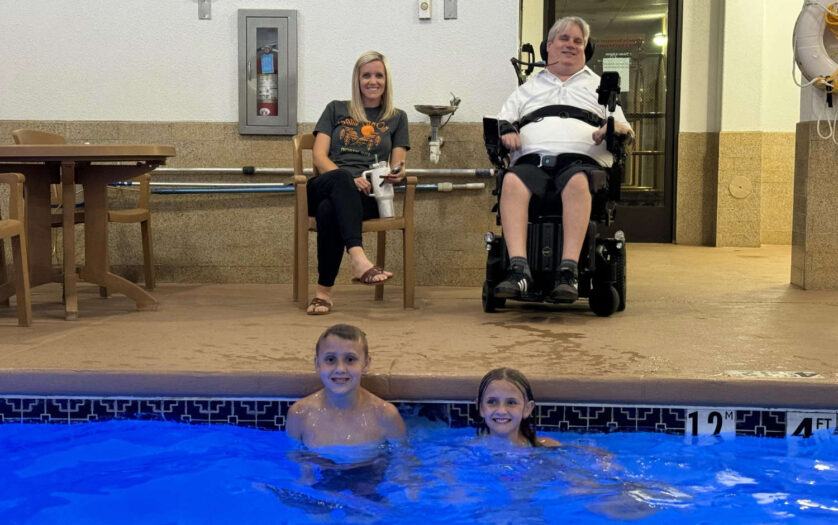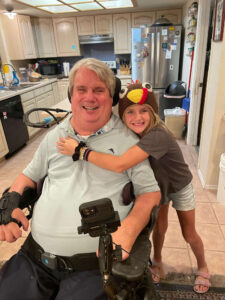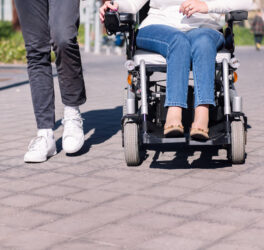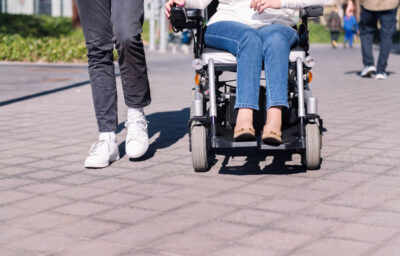
September was Spinal Cord Injury Awareness Month, and somebody out there thought it would be a good idea to have me share a few things I’ve learned since my own spinal cord injury 28 years ago.
I was 22 years old in March of 1997 when I rode a dirt bike for the first… and last time. I believe I am an excellent driver. However, that skill set did not extend to motorcycles because in fewer than 15 minutes, I ran my head into a big tree branch. Within an hour I was in an air evac on the way to the hospital (my second of the year to the same hospital). I had a fairly good idea what I had done to myself because Christopher Reeve had suffered his SCI two years earlier and was frequently in the news. It was still a shock when the neurologist bluntly explained that I had completely severed my spinal cord between my C4 and C5 vertebrae and I would be paralyzed from the chest down the rest of my life.
Before I begin dispensing pearls of wisdom I feel like I should acknowledge just a few of the advantages I’ve had along the way. I have an incredible family who have taken excellent care of me. I was not an easy teenager and frequently terrorized my five younger brothers and sisters. Yet for some reason neither my parents nor my siblings have ever exacted the revenge I rightly deserve. To the contrary, they have spoiled me rotten for nearly three decades. I’m also incredibly lucky to have wonderful friends and caregivers that make my life possible. I’ve also worked for over 20 years for a sports technology company that takes great care of me, and I find a lot of personal satisfaction being a member of that team. I realize that not everyone is so fortunate, so please take my advice with that in mind.
It is now with great contemplation that I present these three takeaways from my years with a spinal cord injury: recognize and appreciate the humor (as well as people who will laugh at your jokes), technology is terrific, and baby your body.
Finding Humor
 Being paralyzed is no walk in the park. I want to address this section with sensitivity because I remember my newly paralyzed reality. Saying, “you can simply choose to be positive and happy even in the face of life-changing trauma” is not helpful. There are going to be bad days and sad times, but finding humor even in some of those tough times can be game changing. I mean, incontinence is arguably the toughest part of this life, but it’s dripping with bad puns and stupid humor. Bottom line for me at least, is that it’s a lot easier to be positive when you are laughing and it’s more enjoyable for the people around you when you’re upbeat.
Being paralyzed is no walk in the park. I want to address this section with sensitivity because I remember my newly paralyzed reality. Saying, “you can simply choose to be positive and happy even in the face of life-changing trauma” is not helpful. There are going to be bad days and sad times, but finding humor even in some of those tough times can be game changing. I mean, incontinence is arguably the toughest part of this life, but it’s dripping with bad puns and stupid humor. Bottom line for me at least, is that it’s a lot easier to be positive when you are laughing and it’s more enjoyable for the people around you when you’re upbeat.
Technology Is Terrific
Back in 1997, when I was first paralyzed, a lot of the assistive technology was fairly new and expensive. Now we have a plethora of exciting tricks and toys that make our everyday lives a lot easier. These days, many of the power wheelchairs are able to give you control of computers and other devices through your driving controls. I use an ASL sip-and-puff system to drive my wheelchair, but I also use it all day long for mouse control on my computer and switch control on my phone. It’s set up so I can quickly switch between devices for drive controls. I like that I can do it while I am tilted back or from about anywhere in my room. It’s no longer very expensive or difficult to set up control lights, fans, shades, or just about any other part of your house from your chair controls or a voice assistant. This is convenient for people in general, but it’s life-changing for us. Additionally, most people take getting in and out of bed for granted. Believe me, I did as well, but this is no small feat since my injury. With the help of my Invacare Patient Lift, I am able to get in and out of my bed with more independence. Another thing that may seem small to most, but is truly transformative for people with limited mobility like me.
Baby Your Body
The last advice I will share here would be to take care of the body that you have. If there was a picture with this article many of you would wonder if it was an example of me finding the humor in things. Unfortunately, I’ve had several occasions to learn this lesson the hard way. You really only get the one body (until someone invents real life avatars). So, it really is important that we take care of them.
Sitting on a good cushion that is set up properly as well as regular and frequent pressure relief can mean the difference between being home and taking part in your daily routines or long stays in the hospital or other care facilities. This may not work well for everyone, but I sleep flat on my back on an alternating air replacement mattress every night. Don’t wait until you have a problem to take your skincare seriously. Once you develop a pressure sore that area will always be more susceptible to break down. If you have a power wheelchair like mine, you can tilt and recline far back to help prevent pressure sores. It’s also very important to get enough rest, pound the H2O, learn and pay attention to your body’s signals, and advocate for your health with your doctors and caregivers.
About the Author
Chad Traeger is a resident of Gilbert, AZ and is a person with a spinal cord injury. He works for a sports technology company and enjoys spending time with his dad and siblings, as well as cruising around town in his souped-up Invacare wheelchair.








